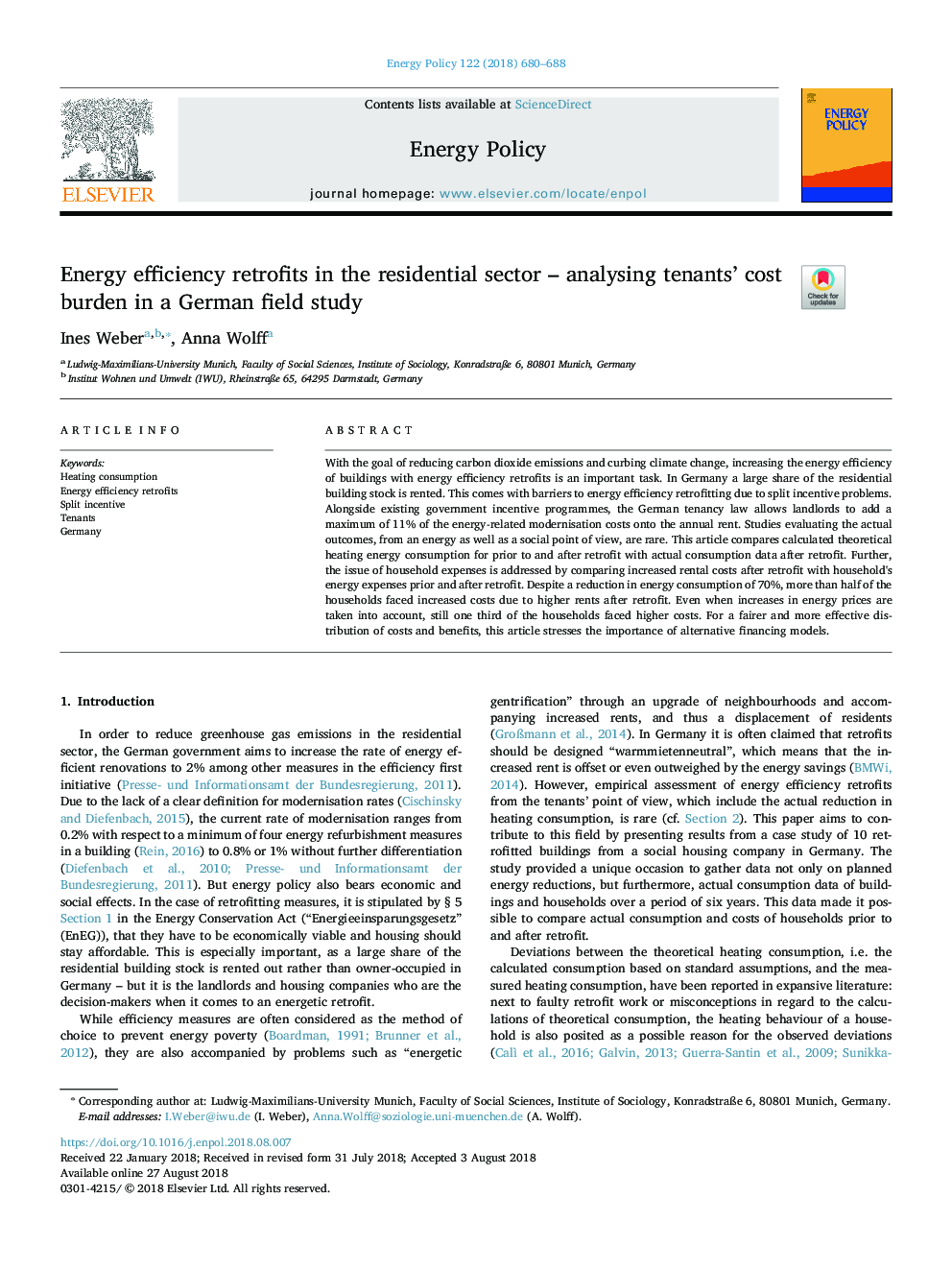| کد مقاله | کد نشریه | سال انتشار | مقاله انگلیسی | نسخه تمام متن |
|---|---|---|---|---|
| 11004965 | 1481236 | 2018 | 9 صفحه PDF | دانلود رایگان |
عنوان انگلیسی مقاله ISI
Energy efficiency retrofits in the residential sector - analysing tenants' cost burden in a German field study
ترجمه فارسی عنوان
صرفه جویی در مصرف انرژی در بخش مسکونی - تجزیه و تحلیل هزینه هزینه اجاره دهندگان در یک مطالعه در زمینه آلمان
دانلود مقاله + سفارش ترجمه
دانلود مقاله ISI انگلیسی
رایگان برای ایرانیان
کلمات کلیدی
مصرف گرمایش، بازده انرژی بهبود می یابد، انگیزه تقسیم شده، مستاجران، آلمان،
ترجمه چکیده
با هدف کاهش انتشار دی اکسید کربن و جلوگیری از تغییرات آب و هوایی، افزایش بهره وری انرژی ساختمان ها با استفاده از مجتمع های انرژی، یک کار مهم است. در آلمان، بخش بزرگی از سهام ساختمان مسکونی اجاره شده است. این امر با موانع پیشروی در بهبود بهره وری انرژی همراه با مشکلات انگیزشی تقسیم می شود. در کنار برنامه های مشوق دولت موجود، قانون اجاره نامه آلمان اجازه می دهد صاحبخانه ها حداکثر 11٪ از هزینه های نوسازی مربوط به انرژی را به اجاره سالانه اضافه کنند. مطالعات ارزیابی نتایج واقعی، از انرژی و همچنین دیدگاه اجتماعی، نادر است. در این مقاله، محاسبه انرژی تئوری مصرف انرژی قبل و بعد از اتمام با داده های مصرف واقعی پس از تکمیل، مقایسه می شود. علاوه بر این، مسئله هزینه های خانوار با مقایسه هزینه های افزایش اجاره پس از تکمیل با هزینه های انرژی خانوار قبل و بعد از تکمیل می شود. علیرغم کاهش 70 درصدی مصرف انرژی، بیش از نیمی از خانوارها با افزایش هزینه ها پس از تکمیل مسکن مواجه شدند. حتی زمانی که افزایش قیمت انرژی در نظر گرفته می شود، هنوز یک سوم از خانوارها هزینه های بیشتری را متحمل شده اند. برای توزیع عادلانه تر و موثرتر هزینه ها و منافع، این مقاله بر اهمیت مدل های تامین مالی جایگزین تاکید دارد.
موضوعات مرتبط
مهندسی و علوم پایه
مهندسی انرژی
مهندسی انرژی و فناوری های برق
چکیده انگلیسی
With the goal of reducing carbon dioxide emissions and curbing climate change, increasing the energy efficiency of buildings with energy efficiency retrofits is an important task. In Germany a large share of the residential building stock is rented. This comes with barriers to energy efficiency retrofitting due to split incentive problems. Alongside existing government incentive programmes, the German tenancy law allows landlords to add a maximum of 11% of the energy-related modernisation costs onto the annual rent. Studies evaluating the actual outcomes, from an energy as well as a social point of view, are rare. This article compares calculated theoretical heating energy consumption for prior to and after retrofit with actual consumption data after retrofit. Further, the issue of household expenses is addressed by comparing increased rental costs after retrofit with household's energy expenses prior and after retrofit. Despite a reduction in energy consumption of 70%, more than half of the households faced increased costs due to higher rents after retrofit. Even when increases in energy prices are taken into account, still one third of the households faced higher costs. For a fairer and more effective distribution of costs and benefits, this article stresses the importance of alternative financing models.
ناشر
Database: Elsevier - ScienceDirect (ساینس دایرکت)
Journal: Energy Policy - Volume 122, November 2018, Pages 680-688
Journal: Energy Policy - Volume 122, November 2018, Pages 680-688
نویسندگان
Ines Weber, Anna Wolff,
